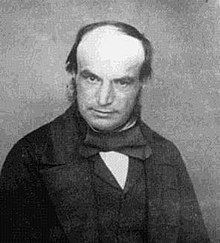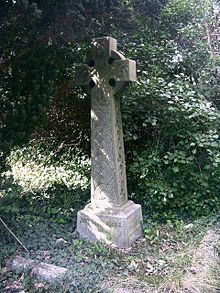John Couch Adams
John Couch Adams (born June 5, 1819 in Laneast near Launceston , Cornwall , England , † January 20, 1892 in Cambridge ) was an English mathematician and astronomer .
Live and act
Adams studied at Cambridge University , where he received his doctorate in 1841 . Around the same time he began investigating the irregularities in the motion of the planet Uranus. He calculated the position of the planet Neptune based on the uneven orbit of Uranus , but his calculations, which he passed on to the royal astronomer George Biddell Airy (1801-1892) in the fall of 1845 , were initially disregarded, which led him to Urbain Le Verrier . He had made similar calculations almost at the same time and passed them on to the German scientist Gottfried Galle (1812–1910) from the Berlin observatory for verification . After a slight correction by about an angular degree, he actually discovered the planet Neptune through his telescope. The question of who came to results first and thus discovered Neptune was at the time a question of national prestige between England and France. Adams took this matter calmly at the time.
Adams was elected to the American Academy of Arts and Sciences in 1847, the Royal Society of Edinburgh in 1849, and the Académie des Sciences in 1857 . In 1858 he became Regius Professor of Mathematics at St Andrews University in Scotland and later at Cambridge . In 1861 he became director of the observatory there .
Letters discovered in 1998 reveal that Adams' calculations were unreliable, causing astronomers at Cambridge to spend weeks looking for the planet in the wrong locations. Adams himself never called his results trustworthy. The files on Adams' calculations have apparently been suppressed since 1850. The essay on the disturbances of Uranus, which he had printed as a manuscript in 1847, was published in the Nautical Almanac in 1851 . From 1851 he was a member of the Göttingen Academy of Sciences . In 1864 he was admitted to the Russian Academy of Sciences as a foreign corresponding member .
The Adams-Bashforth and Adams-Moulton processes (see multi-step process ) are named after him.
In 1866 he was awarded the gold medal of the Royal Astronomical Society , in 1883 admitted to the National Academy of Sciences .
In addition to his astronomical calculations, he also carried out numerous number theoretic calculations. For example, he calculated the Bernoullian numbers bis , the natural logarithms to 273 decimal places and Euler's constant to 261 decimal places (1877), this record was only slightly surpassed in 1952 by John William Wrench with 329 decimal places using an electronic calculating machine.
He bequeathed his collection of incunabula and early prints to the Cambridge University Library in his will . The oldest piece in the collection is a print by Peter Schöffer of Augustin's De verae vitae cognitione .
There is a bust of Adams in the Lawrence House Museum in Launceston .
The asteroid (1996) Adams is named after him, also the moon crater Adams . This is named after him and the astronomers Charles Hitchcock Adams and Walter Sydney Adams . He is also the namesake of the Adams Nunatak on the West Antarctic Alexander I Island .
His brother, William Grylls Adams , edited Adam 's writings.
Works
- An Explanation of the observed irregularities in the motion of Uranus, on the hypothesis of disturbances caused by a more distant planet / by JC Adams. - London: Clowes, 1846. Digitized edition of the University and State Library Düsseldorf
Individual evidence
- ↑ shaper RSE Fellows 1783-2002. Royal Society of Edinburgh, accessed October 3, 2019 .
- ^ JJ O'Connor and EF Robertson (2005) John Couch Adams on the University of St Andrews website; accessed on November 27, 2015.
- ↑ Holger Krahnke: The members of the Academy of Sciences in Göttingen 1751-2001 (= Treatises of the Academy of Sciences in Göttingen, Philological-Historical Class. Volume 3, Vol. 246 = Treatises of the Academy of Sciences in Göttingen, Mathematical-Physical Class. Episode 3, vol. 50). Vandenhoeck & Ruprecht, Göttingen 2001, ISBN 3-525-82516-1 , p. 23.
- ^ Foreign members of the Russian Academy of Sciences since 1724: Adams, John Couch. Russian Academy of Sciences, accessed August 26, 2019 (in Russian).
- ↑ Fabian manual online
literature
- Sky and Telescope , July 2003, p. 26 (on the subject of suppressed documents).
- William Sheehan, Nicholas Kollerstrom, Craig B. Waff: The Neptune Affair . Spectrum of Science, April 2005, ISSN 0170-2971 , pp. 82-88.
Web links
- Entry to Adams; John Couch (1819-1892); Astronomer in the Archives of the Royal Society , London
- John J. O'Connor, Edmund F. Robertson : John Couch Adams. In: MacTutor History of Mathematics archive .
- Publications by JC Adams in the Astrophysics Data System
- Obituaries for JC Adams in the Astrophysics Data System
| personal data | |
|---|---|
| SURNAME | Adams, John Couch |
| BRIEF DESCRIPTION | British mathematician |
| DATE OF BIRTH | June 5, 1819 |
| PLACE OF BIRTH | Laneast at Launceston , Cornwall, England |
| DATE OF DEATH | January 20, 1892 |
| Place of death | Cambridge , England |



